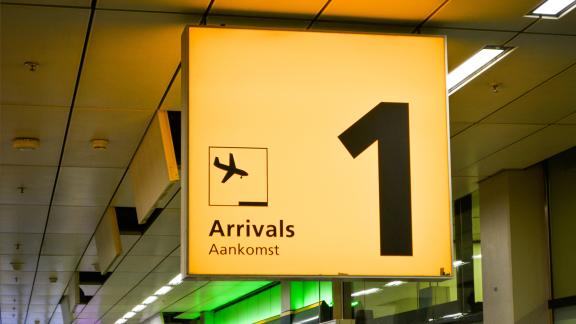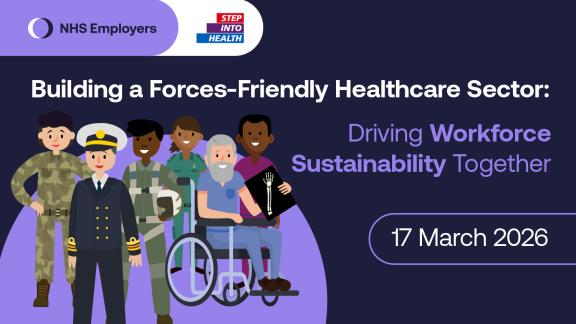Impacts of the changes to the UK immigration policy

Information on how changes to the immigration system will impact international recruits across NHS trusts.
Latest updates
- The language regarding SOC 6131 (nursing auxiliaries and assistants) will be updated. Previously, for purposes of the Immigration Salary List, SOC 6131 only applied in environments where registered nurse roles exist. This will be revised to environment where a registered nurse or other registered health care professional roles exist.
- For applications on or after 16 December 2025, the Immigration Skills Charge will increase by 32 per cent to £1,320 per person per year.
- For new applications on or after 8 January 2026, the English language requirements have been raised from B1 to B2 for Skilled Worker, High Potential Individual, and Scale Up visas.
- For applications on or after 1 January 2027, the length of sponsorship for Graduate Visas will reduce from two years to 18 months. The length of a PhD graduate visa will remain at three years.
Key points
Care worker restrictions
Care workers (SOC 6135) and senior care workers (SOC 6136) will no longer be able to make new applications for visas.
A transition period will be in place until 22 July 2028, which will be kept under review, and will allow individuals to extend or switch from other vias routes, after which these roles will be removed from the ISL and TSL. Workers who are switching from other routes must have been legally employed by their sponsor for at least three months prior to their application to qualify.
Only CQC-registered providers can sponsor care workers in England.
The requirement for sponsors to first try to recruit from the pool of skilled workers seeking new sponsorship before sponsoring new recruits for visas has been removed, due to the closure of these visa applications. Providers are still encouraged to engage with regional partnerships to employ displaced workers.
Salary thresholds
Certificates of Sponsorship issued after 9 April 2025 now have a minimum salary threshold for Skilled Workers of £25,000 per year (£12.82 per hour). This is the absolute base general threshold and will apply to those extending their visas and new applicants.
The increase also applies to the Health and Care Visa route for those occupations paid by NHS bands. Minimum rates increase to reflect the latest national pay scales or £25,000 (whichever is higher).
The announced 25/26 pay award confirms that entry-level band 3 roles will not be above the £25,000 salary threshold. This means that entry-level band 3 roles that do not receive a High-Cost Area Supplement (HCAS) will not be eligible for sponsorship. Applicants would need to meet salary threshold at the point at which they are renewing their visa, but they can continue to work if they hold a valid Right to Work.
Band 3 roles that require renewals on the top step point of the Agenda for Change 25/26 pay scales will meet the required salary threshold and can continue to be sponsored.
See the tables below for details on changes to salary thresholds for Skilled Worker and Health and Care Visa holders, keeping in mind applicants need to meet the higher of their salary threshold or occupation’s going rate.
Increased salary thresholds will apply to both new applications and to extensions to existing visas.
When assessing salary thresholds, employers who recoup business costs, immigration costs or business investments (such as visa fees) via repayment clauses (i.e. which are guaranteed and not conditional) will need to count this against the salary stated on their Certificate of Sponsorship. If this takes the salary below the relevant eligibility requirements, then the individual will not be able to apply for a visa.
Those already on a Skilled Worker Visa before 4 April 2024 are exempt from the £41,700 salary threshold (and standard going rates) when they change occupation or sponsor, or settle. Generally, they will have to meet at least £31,300. However, they will be required to meet the lower salary threshold (and lower going rate) for their role (and their pay should progress in line with resident workers).
The Migration Advisory Committee (MAC) have been commissioned to review salary thresholds.
Actions for employers
|
Immigration Health Surcharge
The Immigration Health Surcharge has increased to £1,035 per person per year for those required to pay, such as skilled workers and their dependants. There is a lower surcharge of £776 per year for applicants under age 18. All Health and Care Visa holders will continue to be exempt from paying the Immigrational Health Surcharge (IHS). Some roles are also eligible for a reimbursement.
Certificate of Sponsorships and Visas costs
From 9 April 2025, Certificate of Sponsorship fees increased from £239 to £525, and immigration and visa fees increased by 7 per cent. Certificate of sponsorship costs should be paid by the sponsor and not passed on to the individual. The new fees will apply to new visa applications and renewals for all working visas, including Skilled Worker Visa and Health and Care Visa.
Immigration Salary List
The Immigration Salary List (ISL) will be phased out but remain in place until December 2026 and occupations on the ISL can be recruited to below the general salary threshold. These occupations will still need to meet a threshold of the higher of either their occupation-specific threshold or:
- £25,000 (for Health and Care Visas)
- £33,400 (for general Skilled Worker visas applicants after April 2024)
- £25,000 (for general Skilled Worker visas applicants before April 2024).
The following Health and Care Visa roles now appear on the expanded ISL:
- SOC 1232 – residential, day and domiciliary care managers and proprietors
- SOC 3111 – laboratory technicians – only jobs requiring 3 or more years’ related on-the-job experience
- SOC 3212 – pharmaceutical technicians
SOC 6131 – nursing auxiliaries and assistants (only applies to roles in environments where registered nurse or other registered health care professional roles also exist*).
*Updated wording coming into effect on 11 November 2025.
Care workers (SOC 6135) and senior care workers (SOC 6136) both appear on the ISL however, new visa applications are closed and in-country switching applications will only remain open until 22 July 2028, with this kept under review.
A full list of the ISL if available on GOV.UK.
Interim Temporary Shortage List
In the interim, a time-limited Temporary Salary List (TSL) will sit alongside an ISL. This will enable international recruitment only where occupations are key to industrial strategy or building crucial infrastructure.
Laboratory technicians (SOC 3111) are the only Health and Care Visa occupation that appear on the TSL, regardless of years of experience.
The MAC has been commissioned to conduct a review of the TSL including occupations, salaries and benefits. Occupations on the TSL will not be permitted salary and visa fee discounts. The occupations included on the TSL are time-limited until the end of 2026 and will only remain beyond that date if the independent MAC recommend it.
The Migration Advisory Committee (MAC) will review the lists over the next year and domestic workforce strategies will need to be in place to justify continued inclusion. The MAC have published the Stage 1 report on its review of the Temporary Shortage List (TSL). The Stage 2 consultation is now open. The MAC is seeking further evidence in a call for evidence (CfE) on the occupations that passed stage 1 to identify which it will recommend adding to the TSL. For the health and care sector, this includes:
Learn more about the stage 2 consultation and more information on our website. |
A full list of TSL is available on GOV.UK.
Health and Care Visa roles removed from the Skilled Worker route
Six roles previously eligible under the Health and Care Visa no longer meet the skills threshold and are not on either the ISL or TSL. Therefore, they will no longer be eligible for sponsorship and domestic workforce strategies will need to be in place. A transition period applies, where skilled workers can continue to be sponsored in RQF 3-5 level occupations if they are already in the route (have a visa or have a Certificate of Sponsorship issued) before 22 July 2025, even where an occupation is not on the Immigration Salary List or the interim Temporary Shortage List. The roles are:
- SOC 1231 – healthcare practice managers
- SOC 3211 – dispensing opticians
- SOC 3213 – medical and dental technicians
- SOC 3219 – health associate professions n.e.c
- SOC 6132 – ambulance staff (excluding paramedics)
- SOC 6133 – dental nurses.
Workers sponsored in occupations on either the TSL or the ISL at RQF levels 3-5 will not be able to bring dependants. This does not apply to occupations at RQF 6 or above, or workers sponsored in occupations at RQF levels 3-5 who are already in the skilled worker route and able to bring dependants before these changes come into effect.
Family visas
The minimum income requirement for family visas increased to £29,000 from 11 April 2024. MAC published the results of their commission into reviewing this threshold, and did not recommend a specific threshold but did suggest a range between £24,000-£28,000. The government have not yet formally responded.
Immigration White PaperIn May 2025, the government published the immigration white paper that outlined changes to the UK immigration system to prioritise "control, contribution, and community cohesion". Changes will impact the whole immigration system including illegal and legal migration routes of work, study, and family. For more details of the impact of the changes in the Immigration White Paper please see our latest news. Further changes to be implemented by the end of this year also include:
More information can be found on the GOV.UK website. |
Below is a description of how these changes will impact various international staff across the NHS and social care. All scenarios are based on the Agenda for Change pay scales 2025/26, which are subject to annual review.
The Home Office intends to continue updating going rates each April based on the latest available salary data. Employers should bear in mind that the current going rates may increase for future applications.
Health and Care Visa
- Applies to those on a Health and Care Visa (such as nurses, doctors, allied health professionals, etc).
- The Health and Care Visa is a sub-type of the Skilled Worker Visa. During the application process, candidates will be asked if they are applying for a Health and Care Visa and will need to select ‘yes’.
- Only CQC-registered providers in England will be able to sponsor care workers or senior care workers.
- The cost of a Certificate of Sponsorship is £525 and applies to both new work visas and renewals. The fee should be paid by the sponsor and not passed on to the individual.
- Salary threshold – national pay scale roles: the minimum salary threshold is £25,000 for occupations on national pay scales where applicable. This will apply to both new applications and to extensions to existing visas.
- Salary threshold – not on national pay scale roles: the general salary threshold is £31,300 for occupation not on national pay scales (such as biomedical scientists) or their occupation specific threshold, whichever is higher. This will apply to both new applications and to extensions to existing visas.
- Salary threshold – assessments: employers who recoup business costs, immigration costs or business investments (such as visa fees) via repayment clauses (i.e. which are guaranteed and not conditional) will need to count this against the salary stated on their Certificate of Sponsorship. If this takes the salary below the relevant eligibility requirements, then the individual will not be able to apply for a visa.
- Immigration Salary List: for Health and Care Visa occupations on the ISL, the salary threshold is set at either £25,000 or their occupation-specific threshold, whichever is higher.
- Temporary Shortage List: Laboratory technicians (SOC 3111) are the only Health and Care Visa occupation that appear on the TSL, regardless of years of experience. These roles do not have a salary threshold reduction and therefore will meet to meet £33,400 or their occupation-specific threshold, whichever is higher.
- Immigration Health Surcharge: current and new visa holders will continue to be exempt from the IHS.
- Immigration Skills Charge increase: For applications on or after 16 December 2025, the Immigrations Skills Charge will increase by 32 per cent to £1,320 per person per year.
- Dependants: Health and Care Visa holders can still bring dependants to the UK as part of their visa (except new applicants who hold roles below degree level). Dependants have a general right to work meaning that they can be employed by the NHS, in another sector or not work.
- Individuals who are in the UK on any other route, including where that route permits dependants, who switch into a below graduate level role after 22 July 2025, will not be able to stay with (or bring over) dependants. This applies to those switching from a Graduate Visa to a Health and Care Visa.
- Regional partnerships: the requirement for sponsors to first try to recruit from the pool of skilled workers seeking new sponsorship has been removed before sponsoring new recruits for visas. Providers are still encouraged to engage with regional partnerships to employ displaced workers.
To prevent the occupation SOC 6131 (nursing auxiliaries and assistants) being misused, a clarification is being added to confirm this occupation code only applies to roles in environments where registered nurse and other registered health and care professional roles also exist.*
*Updated wording coming into effect on 11 November 2025
Skilled Worker Visa
- Applies to those roles not eligible for a Health and Care Visa (general Skilled Worker Visa) but sponsored by an NHS trust (such as IT and finance professionals, administrative staff, etc).
- Salary threshold: new applications will need to meet the increased general salary threshold of £41,700. The minimum salary threshold for Skilled Workers is £25,000 per year (£12.82 per hour). This is the absolute base general threshold and will apply to those extending their visas and new applicants.
- Those already in the Skilled Worker route before 4 April 2024 are eligible for a lower going rate (generally at least £31,300) when changing sponsor, job role or extending. The Home Office would expect their pay to progress at the same rate as resident workers in the same role; therefore, they would be subject to the updated 25th percentiles using the latest pay data when they next make an application to change employment, extend their stay, or settle. This is in-line with normal practice.
- The cost of a Certificate of Sponsorship is £525 and applies to both new work visas and renewals. The fee should be paid by the sponsor and not passed on to the individual.
- Salary threshold – assessments: employers who recoup business costs, immigration costs or business investments (such as visa fees) via repayment clauses (i.e. which are guaranteed and not conditional) will need to count this against the salary stated on their Certificate of Sponsorship. If this takes the salary below the relevant eligibility requirements, then the individual will not be able to apply for a visa.
- Immigration Salary List: for occupations on the ISL, a threshold of either £33,400 or their occupation-specific threshold, whichever is higher.
- Temporary Shortage List: occupations on the TSL will not be permitted salary and visa fee discounts. The occupations included on the TSL are time-limited until the end of 2026 and will only remain beyond that date if the independent MAC recommend it.
- Immigration Health Surcharge: they will need to pay the increased immigration health surcharge (IHS) of £1,035 per year per applicant (£776 per year for dependants under age 18) but may be able to apply for a reimbursement.
- Immigration Skills Charge increase: For applications on or after 16 December 2025, the Immigrations Skills Charge will increase by 32 per cent to £1,320 per person per year.
- Dependants: they can still bring dependants to the UK as part of their visa (expect new applicants who hold roles below degree level). Dependants have a general right to work meaning that they can be employed by the NHS, in another sector or not work.
- Individuals who are in the UK on any other route, including where that route permits dependants, who switch into a below graduate level role after 22 July 2025, will not be able to stay with (or bring over) dependants. This applies to those switching from a Graduate Visa to a Skilled Worker Visa.
Social care
- Care workers (SOC 6135) and senior care workers (SOC 6136) will no longer be able to make new applications for visas.
- A transition period will be in place until 22 July 2028, which will be kept under review, and will allow individuals to extend or switch from other vias routes, after which these roles will be removed from the ISL and TSL. Workers must have been legally employed by their sponsor for at least three months prior to their application to qualify.
- The requirement for sponsors to first try to recruit from the pool of skilled workers seeking new sponsorship has been removed before sponsoring new recruits for visas, due to the closure of these visa applications. Providers are still encouraged to engage with regional partnerships to employ displaced workers.
- Only CQC-registered providers can sponsor care workers and senior care workers in England.
- Care providers who were sponsoring workers in exclusively non-regulated activities (and therefore not required to be registered with the CQC) before April 2024 can continue to sponsor these workers, including for extensions to their visa on those terms, but not hire new ones.
- The cost of a Certificate of Sponsorship is £525 and applies to both new work visas and renewals. The fee should be paid by the sponsor and not passed on to the individual.
- Salary threshold: the general salary threshold for health and care worker occupations not on a national pay scale is £31,300. This will apply to both new applications and to extensions for existing visas only, as no new applications can be made.
- Salary threshold – assessments: employers who recoup business costs, immigration costs or business investments (such as visa fees) via repayment clauses (i.e. which are guaranteed and not conditional) will need to count this against the salary stated on their Certificate of Sponsorship. If this takes the salary below the relevant eligibility requirements, then the individual will not be able to apply for a visa.
- Immigration Salary List: for Health and Care Visa occupations on the ISL (currently including care workers and senior care workers), the salary threshold will be set at either £25,000 or their occupation-specific threshold, whichever is higher. Individuals can extend or switch from other visa routes, after 22 July 2028 care workers (SOC 6135) and senior care workers (SOC 6136) will be removed from the ISL.
- Immigration Health Surcharge: they will continue to be exempt from the IHS.
- Dependants: Where a care worker or senior care worker was in route before 11 March 2024, but has not yet brought dependants, they can bring dependants during their sponsorship (on this visa) and will be able to remain with their dependants, including extending, changing employer (within their SOC code) and settlement.
- Individuals who are in the UK on any other route, including where that route permits dependants, who switch into the Health and Care Visa as a care worker or senior care worker after 11 March 2024, will not be able to stay with (or bring over) dependants. This applies to those switching from a Graduate Visa to a Health and Care Visa.
Dependants
- Dependants cannot be brought over with anyone being sponsored to an RQF level 3-5 role (for new applications or for those switching from an existing Right to Work that have dependants with them, such as a Graduate Visa). Anyone already sponsored in an RQF level 3-5 role with dependants in the UK won’t be affected.
RQF level 6 roles and above will still be able to bring dependants with them.
- Dependants of those on a Health and Care Visa and Skilled Worker Visa can be employed by an NHS trust at any role regardless of skill level or salary threshold, as long as the main visa holder meets the appropriate general salary threshold.
- The minimum income requirement for family visas (i.e. British citizens bringing dependents to the UK) starts at £29,000 from 11 April 2024.
- Care workers and senior care workers already in route before 11 March 2024 can remain with their dependants, including extending, changing employer (within their SOC code) and settlement.
- Where a care worker or senior care worker is in the route before 11 March 2024 but has not yet brought dependants, they will be allowed to bring dependants during their sponsorship (on this visa).
- Individuals who are in the UK on any other route, including where that route permits dependants, who switch into the Health and Care Visa as a care worker or senior care worker after 11 March 2024, will not be able to stay with (or bring over) dependants.
The government has reassured us that, while it is determined to reduce net migration, it understands the importance of internationally educated health and care workers. We understand that these changes are likely to result in a number of questions, especially for internationally educated staff and those working on international recruitment.
Please see the FAQs below and continue to check the NHS Employers and GOV.UK websites for latest information.
Did you know we offer a variety of free bulletins?
Sign up to:
- keep updated on national and local workforce issues
- be the first to hear about our events and new resources
- hear the latest developments in specific areas



